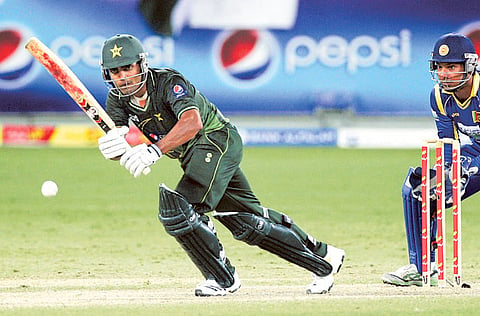End of the road for Umar Akmal, Pakistan cricket’s troubled child
Pakistan cricket in the news as former skipper Salim Malik seeks retribution

Dubai: Pakistan cricket found itself making the headlines this week during a quiet phase - albeit for the wrong reasons. Umar Akmal, the wicketkeeper-batsman who had often been referred to as the troubled child of their country’s cricket, was expectedly handed a three-year ban on corruption charges while veteran Salim Malik sought a retribution from the cricket board on Sunday for his wrongdoings in the past.
The Pakistan Cricket Board (PCB) announced on Twitter: “Umar Akmal handed three year ban from all cricket by chairman of disciplinary panel Justice (retd.) Faizal-e-Miran Chauhan.”
Akmal had earlier admitted in an interview that he was offered money to skip matches against India, also revealing that he was asked to leave two deliveries in a match by the bookies.
“I was once offered $200,000 for leaving two deliveries. I was also offered to skip matches against India,” Akmal was quoted as saying by GeoTV.
Akmal,31, had not requested for a hearing before the Anti-Corruption Tribunal after he was charged for two breaches of Article 2.4.4 of the PCB Anti-Corruption Code in two unrelated incidents.
Article 2.4.4 of the PCB Anti-Corruption Code reads as: “Failing to disclose to the PCB Vigilance and Security Department (without unnecessary delay) full details of any approaches or invitations received by the Participant to engage in Corrupt Conduct under this Anti-Corruption Code”.
I am very sorry for what I had done 19 years ago. I am ready to extend unconditional cooperation to the International Cricket Council and the Pakistan Cricket Board in this regard

Article 4.8.1 of the PCB Anti-Corruption Code reads as: “In such circumstances, a hearing before the Anti-Corruption Tribunal shall not be required. Instead, the Chairman of the Disciplinary Panel (sitting alone) shall issue a public decision confirming the offence(s) under this Anti-Corruption Code specified in the Notice of Charge and the imposition of an applicable sanction within the range specified in the Notice of Charge. Before issuing that public decision, the Chairman of the Disciplinary Panel will provide written notice of that decision to the National Cricket Federation to which the Participant is affiliated, the PCB Vigilance and Security Department and the ICC.”
It’s now certainly the end of the road for Akmal, now 30, who made an extremely promising international debut in 2009 before getting involved into controversies from time to time. He had last represented Pakistan in two Twenty20 internationals against Sri Lanka in Lahore last year, falling to first ball ducks on both occasions.
Akmal’s brush with law came in 2014 when he was arrested in February 2014 after a scuffle with a traffic warden who stopped him for a signal violation. Two years later in 2016, he was dropped from Pakistan’s tour of England after former coach Waqar Younis made complaints about his behaviour.
As someone who has so far played 16 Tests (1003 runs), 121 one-day games (3044 runs) and 84 Twenty20s (1690) for Pakistan, Akmal was poised to serve their cricket for some more years, but clearly the establishment had chosen to look beyond him for his track record.
In another development, Salim Malik, now 57 and a former Pakistan skipper, apologised to the nation over match-fixing after long 19 years and said he was ready to reveal details linked to the corruption charges which earned him a life-ban in 2000.
“I am very sorry for what I had done 19 years ago. I am ready to extend unconditional cooperation to the International Cricket Council and the Pakistan Cricket Board in this regard,” he said in a video message.
When contacted, sources in the ICC told Gulf News that the governing body was in no position to intervene into the episode after all these years. ‘‘Firstly, the ICC didn’t have any Anti-Corruption Unit those days and hence, we don’t have any records. It’s upto the PCB and Malik,’’ the sources added.
Sign up for the Daily Briefing
Get the latest news and updates straight to your inbox







